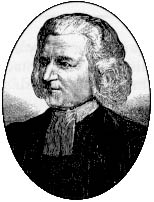
1707 – 1788
Nine thousand poems; 27,000 stanzas; 180,000 lines. The output of Charles Wesley was prodigious. It was, in fact, three times the total output of William Wordsworth, one of England’s most prolific poets. Had Wesley written poetry every day, he would have written ten lines per day for fifty years.
Charles could write poetry for any occasion. When his wife Sally was entering upon the rigours of childbirth, he wrote a poem for her, one which she could use as a prayer:
Who so near the birth hast brought,
(Since I on Thee rely)
Tell me, Saviour, wilt thou not
Thy farther help supply?
Whisper to my list’ning soul
Wilt thou not my strength renew,
Nature’s fears and pangs control,
And bring thy handmaid through?
(Since I on Thee rely)
Tell me, Saviour, wilt thou not
Thy farther help supply?
Whisper to my list’ning soul
Wilt thou not my strength renew,
Nature’s fears and pangs control,
And bring thy handmaid through?
At the funeral of George Whitefield (considered to be the finest preacher of the eighteenth-century Evangelical Awakening) he praised his departed friend in a poem 536 lines long!
While Wesley’s poetry chiefly concerned the themes of the gospel message, he tried to enter imaginatively into the stresses of all manner of people. Today we can read his poetry about wives and widows, coalminers and criminals, high school students, and soldiers who remained loyal to the British crown during the American War of Independence.
Susanna, mother of the Wesleys, was the twenty-fifth (and last!) child of a well-known Puritan preacher. She in turn had nineteen children herself, John being the fifteenth and Charles the eighteenth. Both boys were academically gifted, both eventually studied at Oxford, and both were ordained to the Anglican priesthood.
After a period of frustration, rejection, and self-doubt as missionaries in Georgia, John and Charles returned to England. Kezia, their youngest sister, told them she had come to believe and to understand that God could perform a work of transforming grace in the human heart. Believers were granted new standing before God, a new nature, new outlook, new motivation and new affections. Charles proved it all for himself on May 21, 1738. He wrote in his journal. “By degrees the Spirit of God chased away the darkness of my unbelief. I found myself convinced. . . . I saw that by faith I stood.” His experience resulted in the writing of a hymn which Christians still sing:
And can it be that I should gain
An interest in the Saviour k blood?
Died He for me, who caused His pain ?
For me, who Him to death pursued?
Amazing love! how can it be
That Thou, my God, shouldst die for me?
Three days later, his older brother came to the same conviction and experience: “I felt my heart strangely warmed. I felt I did trust in Christ, Christ alone, for salvation; and an assurance was given me that he had taken away my sins … and saved me from the law of sin and death.” The spark which ignited Methodism had been struck.
In no time, the conflagration was spreading everywhere. Together with Whitefield (the third strand in their “threefold cord”), the Wesleys soon found that hostile church officials had barred them from pulpits. They moved out-of-doors, where they were free to announce the Good News to people who were as unacquainted with the Bread of Life as they were hungry for it. Crowds of up to 25,000 gathered regularly to hear them.
While both John and Charles were gifted at preaching and hymnwriting, Charles was especially noted for his genius at Christian song. Yet there was more than genius here. Charles had been prepared for his music-ministry by nine years of studying classics at Oxford, particularly the work of the ancient Greek and Latin poets. Most importantly, his whole-souled encounter with his Lord had issued in such passion and depth as to fuse and focus all gifts and graces, talents and training.
Brother John thought highly of Charles’ work: “Here is no doggerel, no botches, nothing to patch up a rhyme, no feeble expletives. Here are … the purity, the strength, and the elegance of the English language.”
John was in Newcastle when he learned of the death of Charles. The next Sunday, as he was conducting worship, the congregation sang one of Charles’ earliest hymn-lines: “My company before is gone, And I am left alone with Thee. . . .” John unravelled. He staggered back into the pulpit, weeping profusely. The congregation waited for him, and he recovered enough to finish the service.
The hymns of Charles Wesley breathe the man’s life in God. It was rich; so rich, in fact, that later Methodists were sometimes reluctant to sing many of his hymns, as their experience of God was not his. Whereas God’s grace and truth had moved Charles profoundly and had found stirring expression in his hymns, the same hymns struck some of his descendants as mere literary exaggeration.
His descendants were wrong. There was no exaggeration. He who wrote, “Love divine, all loves excelling,” wrote that hymn and many others only because he had been taken up into a reality infinitely greater than even he could express.
Victor Shepherd